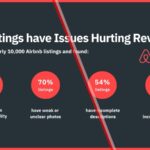New Hospitable Marketplace Connects Hosts to 150K Vetted Cleaners
- Hospitable has rolled out a new Cleaner Marketplace powered by Cleanster, alongside a major update to its Operations platform, designed to tackle turnovers.
- Launching first in the U.S. and Canada, the marketplace connects hosts to a screened, vetted, and reviewed network of over 150,000 cleaners.
- Fully embedded in Hospitality’s PMS, it allows hosts to build custom checklists, get transparent quotes, and auto-assign, dispatch, and pay cleaners without third-party tools.
- Accountability is central: cleaners upload before-and-after media, door photos, and notes, while hosts and cleaners can communicate directly within Hospitable with timestamped records.
- Real-time tracking covers arrival through completion. Hospitable has also introduced task-specific smart lock codes for secure, time-bound access.
- On the operations side, automated checklists adapt to context, party size, pets, sofa sleeper use, or guest-reported issues, ensuring every turnover reflects actual guest activity.
About Hospitable
Hospitable is a tool that simplifies short-term rental management by automating tasks like guest communication, scheduling, and managing listings on platforms such as Airbnb, Booking.com, and Vrbo. Hospitable also offers features for creating direct booking websites and integrates with Google Vacation Rentals for more booking opportunities.
Snigdha’s Views
- Cleaning and turnovers have long been one of the biggest operational headaches in STRs, made worse by industry-wide challenges like staffing shortages and rising guest expectations.
- Hospitable’s Cleaner Marketplace takes a direct swing at this by embedding vetted, screened, and reviewed cleaners into the PMS itself, reducing dependence on fragmented third-party solutions.
- For smaller operators, this lowers the barrier to professionalized operations. Access to a large, vetted network of cleaners lets them compete on reliability with larger companies.
- For larger managers, the marketplace is more about enforcing consistency at scale. Features like before-and-after media, door photos, and guest-reported issues rolling into the next turnover allow them to standardize accountability across portfolios.
- PMS platforms are no longer just about calendar syncing and guest messaging; they’re evolving into handling core operations end-to-end.
OYO’s Parent Rebrands as Prism Ahead of IPO Plans
- OYO’s parent company, Oravel Stays, has officially rebranded as Prism, marking a corporate reset just as it prepares for a fresh IPO (Initial Public Offering) filing.
- “Interestingly, the name ‘Prism’ was selected through a global naming competition that drew more than 6,000 submissions.
- The company abandoned earlier IPO filings in 2021 and 2023, which makes this third attempt as much about proving resilience as it is about raising capital.
- Reports suggest the company is targeting a valuation of $7–8 billion.
- Prism reflects OYO’s bid to move beyond budget hotels and reposition as a diversified hospitality group with upmarket ambitions, even working on a premium-focused app.
- Its portfolio spans economy brands like Motel 6, lifestyle and midscale concepts such as Townhouse, and European vacation rentals through Belvilla and DanCenter, signaling its intent to capture guests across segments, regions, and stay types.
- OYO posted a Q1 profit of $22.7M, with revenue up 47% and gross booking value up 144%. The rebrand underscores a broader reset, signaling that the company aims to prove lasting profitability, not just a new name.
About OYO
OYO is one of the world’s largest budget hotel and accommodation networks, best known for its standardized, affordable stays across Asia, Europe, and beyond. The brand focuses on the mass-market traveler segment, offering budget hotels, guesthouses, and homestays.
Snigdha’s Views
- Over the years, OYO has expanded by acquiring regional players, technology platforms, and local operators, such as Checkmyguest and the Leisure Group in US and Europe.
- For property managers, the rebrand is relevant because OYO still owns European vacation rental brands like Belvilla and DanCenter, and Prism signals these won’t be sidelined. Instead, they’re becoming central to the group’s diversification story.
- Ultimately, Prism is about convincing both investors and partners that OYO has moved beyond its “budget chaos” reputation.
Austin’s Latest Rental Crackdown Reduces Licenses, Expands Platform Accountability
- Austin, Texas, just revised its STR rules, further restricting how many STRs are allowed in multifamily buildings and setting new responsibilities for both platforms and tenants.
- The city’s updated ordinance cuts the allowable share of STRs in apartment complexes from 25% to 10%, unless the building includes commercial use.
- It also allows tenants to apply for licenses, with landlord approval, and places new obligations on platforms like Airbnb and Vrbo, including verifying license numbers and honoring delist notices.
- The obligations for platforms (Airbnb, Vrbo) now take effect July 1, 2026, and other provisions kick in October 1, 2025.
- Another important change is to the spacing rule. Previously applied unit-to-unit, it now applies lot-to-lot, which allows up to two STRs on the same property while still requiring a 1,000-foot buffer between separate sites.
- City officials emphasized compliance, enforcement, and fair contribution to hotel occupancy taxes, alongside balancing tourism with housing.
Snigdha’s Views
- What’s happening in Austin is part of a broader U.S. trend: stricter caps on licenses, tighter rules in multifamily housing, and accountability requirements for platforms.
- While city officials frame this as protecting housing and improving enforcement, the practical outcome is fewer licenses and more friction for professional managers, echoing what we’ve already seen in Beverly Hills and Maui.
- At the same time, platforms are countering this narrative with economic impact data. Airbnb, for example, has rolled out Oxford Economics reports in Europe, the U.S., and most recently India, where it claims STRs contributed $1.4B to the economy and supported 111,000 jobs in 2024.
- Managers can pair Airbnb’s data with your own local examples to show policymakers how your rentals create jobs, support small businesses, and keep tourism dollars in neighborhoods, small actions that have already helped soften rules in places like Lisbon, the UK, and Missouri.
Snigdha Parghan is a Content Marketer at RSU by PriceLabs, where she creates articles, manages daily social media, and repurposes news and analysis into podcasts and video content for short-term rental professionals. With a focus on technology, operations, and marketing, Snigdha helps property managers stay informed and adapt to industry shifts.








